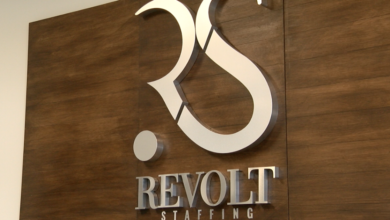RTO And Revenue Growth, An AI Model For HR And How Executives Harm Diversity Goals

An office sits vacant on October 27, 2022 in San Francisco, California. (Photo by Justin Sullivan/Getty Images)
Getty Images
This is the published version of Forbes’ Future of Work newsletter, which offers the latest news for chief human resources officers and other talent managers on disruptive technologies, managing the workforce and trends in the remote work debate. Click here to get it delivered to your inbox every Monday!
Just as the debate seemed to be quieting down about whether work from home helps or hurts productivity, here comes new research that could arm workers with another argument for flexibility: Higher revenue growth. We dug into research from Boston Consulting Group and Scoop, a hybrid work management company that produces the Flex Index, which found that companies with more flexible policies for remote work also tend to have higher revenue growth. While there’s no clear answer that flexibility causes growth—the growth could be a symptom of other progressive policies, or faster growth could prompt companies to offer more flexibility—the data could at least help quiet the voices that say it’s going to do harm.
One thing our published story on the research didn’t get into was another interesting analysis in the report. They compared Flex Index data, which acts as an online “repository” of remote work policies for some 7,500 companies, to occupancy data from Kastle Systems, which tracks badge swipes in 10 major cities. Despite there being a lot of talk that post-Labor Day mandates would usher in much higher occupancy rates—and that workers aren’t following the in-office requirements their companies are setting—the typical hybrid policy in Scoop’s data is actually roughly similar to the occupancy levels in Kastle’s data.
That means we may not see occupancy rates get much higher, Scoop CEO Rob Sadow told me, and people may be following the mandates closer than it seems. It’s not that “policy is set at a higher level and people are not following it,” he says. For many companies, “the policy just isn’t four days a week in office. That’s why you’re not going to see the data jump up.” Check out more in our story here, and in the report here.
Wherever you’re working, hope it’s a great week.
HUMAN CAPITAL
It’s official: The United Auto Workers strike is history. Last week, employees at Ford, Chrysler and Jeep maker Stellantis and General Motors all ratified new contracts with each company. The contracts, which are all fairly similar, provide employees with 25% raises. Depending on the automaker, they also include provisions including cost-of-living adjustments, rights to strike in the future and enhanced pension contributions. While none of the agreements passed overwhelmingly—they were approved by 55% of GM workers, 68% of Stellantis workers and 68% of GM workers—they all were approved nonetheless.
This success—plus the resolution of the SAG-AFTRA strike earlier this month and the agreements reached by more than 53,000 members of Las Vegas hotels’ Culinary and Bartenders Unions—foreshadows much more union activity in the near future. Last Thursday, hundreds of employees at several Starbucks locations across the country walked off the job demanding improved staffing and schedules. It was Red Cup Day, during which the chain hands out reusable holiday cups to its customers. Many Starbucks employees have worked toward unionizing at many of the company’s stores throughout the U.S., with about 340 stores joining the Starbucks Workers United union so far. The National Labor Relations Board has previously accused Starbucks of union-unfriendly actions, including closing locations at which employees wanted to unionize.
POLICY + PRACTICE
People with criminal records may have an easier time rejoining the workforce. New York Gov. Kathy Hochul signed the Clean Slate Act last week, which automatically seals criminal records for those who have committed certain crimes after a certain time period. Misdemeanor convictions will be sealed three years after release, while many felony convictions—with exceptions for serious crimes including murder and sexual crimes—will be sealed eight years after release.
New York is now one of 12 states that has a law that automatically seals criminal records so they don’t interfere with future employment opportunities. There are no federal laws that prohibit employers from using criminal records as a factor in hiring decisions, and even though it is illegal to ask about prior convictions in several states, they often show up on pre-employment background checks. According to a 2020 paper in Michigan Law Review, fewer than 10% of people are successful in using administrative processes to seal criminal records themselves, giving laws like this one an outsized impact. People with prior convictions can help build out the workforce, and, according to a study last year from the Society for Human Resource Management, 92% of workers said they are comfortable working alongside someone with a nonviolent criminal record.
ARTIFICIAL INTELLIGENCE
While online HR resources are important for employees, they may be difficult for someone who is not in the department to navigate. Last week, tech company Notion introduced its solution: An AI-powered chatbot called Q&A that can query all of the documents and information stored in a workspace. In addition to plain-spoken answers, the chatbot also returns links to primary information—like if a user asks a question about health benefits, Q&A will offer a link to the benefit explanation. Notion, which has been valued at $10 billion, also has an AI-powered text summarization tool. About half of its users are paid subscribers.
“Companies have realized the power of this,” cofounder Akshay Kothari told Forbes. “I have a feeling Q&A will take us even more into B2B land because it’s a product that’s remarkably useful in a team setting.”
WHAT’S NEXT: JOSH BERSIN
Human resources industry analyst Josh Bersin, who is CEO of an eponymously named research and advisory firm, chatted with Forbes about his new AI-powered assistant for HR, the impact of artificial intelligence on the industry and his predictions for 2024. Excerpts from our conversation below have been edited for length and clarity.
Give me a sense of how your new chatbot assistant for HR, Galileo, is different from just an amped up search capability of your content?
We’ve developed a library of predefined prompts. These are specific questions people have asked. If I want to [learn about] pay equity, I can go in here and I can say, show me what the best practices are for pay equity. It looks at only our content, so customers can trust it. They don’t have to wonder where it comes from. … When you load your own data into it, you can turn it into your own custom system. What we basically built is a deep, deep industry AI system that knows a lot about this domain without having to crowdsource stuff from the Internet and deal with intellectual property problems.
What is getting the most attention from HR leaders when it comes to AI?
The big issue in recruiting and internal mobility and skills is what I call talent intelligence tools. These are systems that take huge amounts of data about people—all of the employees in the company and all of the employees in the job market. They tell you things that you really can’t tell very much on your own. What skills are trending up in the company? What skills are trending down? Of the job candidates in our pipeline, which have the skills that we need the most? I think that’s going to change the tech landscape.
What a lot of these systems are doing is they’re inferring the skills and allowing people to tag them and then putting them into a database. The challenging part for companies is the different tools are in different places.
Where else is AI going to make a big impact?
One is training. I mean, the training market is going to be completely disrupted by this. … [AI programs] will take a document and read it and create courses and chapters around the document. … I think this is going to be a big trend. People can develop content much more quickly, they can get it out in a more digestible form, you don’t have to spend months developing these courses.
There’s so much junky training content—like, about how to use software, how to fill out your expense account. Nobody likes going through those courses. You never remember anything. So just have a chatbot that searches the documentation and gives you the answer.
Looking out, first half of next year, what will CHROs be focused on most when it comes to HR tech?
Everybody wants a multi-functional chatbot for employees so they can log a timecard, book a vacation, change benefits, book a class, whatever. Companies spend hundreds of millions of dollars on their employee portals. Little by little, the generative AI platforms are beginning to be smarter and smarter and they can not only answer questions, but they can take you into an enterprise system so you can conduct a transaction.
The theme of HR tech next year is pretty clear to me. If the system is not intelligent enough to make it easy for me to use it, I’m not going to use it. I’m going to ask the HR person to do it for me.
Ten years ago most HR tech tools weren’t even for employees, they were just for HR people. Now we’re saying let’s just let the employees do this. And people are like ‘I don’t want to learn how to do all this. I’m doing my regular job.’ I think one of the themes for 2024 is using AI to make employees’ life easier and easier, and stop trying to teach them to do something that they only do twice a year.
FACTS AND COMMENT
While SAG-AFTRA’s board approved of the contract between the union and Hollywood studios, some members are taking issue with its AI sections, which allow limited reasons to create digital doubles of actors without their permission.
86%: Proportion of SAG-AFTRA board members that approved the contract, currently being voted on by union members
118: Number of days the strike lasted. It will continue if the contract is not approved by members.
‘We are in for a very unpleasant era for actors and crew’: Actress Justine Bateman said in a post on X that broke down what she saw as the agreement’s weaknesses
VIDEO
Inside Pharrell Williams’ $1 Billion Plan For Black And Hispanic Entrepreneurs
STRATEGIES + ADVICE
Today’s world is extremely divisive, but we all need to get along at work. Here’s how to communicate across the ideological spectrum.
Read this if you’re unsure about what bringing AI into your workplace actually means.
Team building goes beyond the traditional happy hour, and can be even better without alcohol.
QUIZ
It’s official: Baseball’s Oakland A’s are moving. Which city will be the new home of the franchise and its more than 600 employees, starting in 2025?
- Los Angeles
- Montreal
- Las Vegas
- Omaha
See if you got the right answer here.
Thanks for reading! Follow us on Twitter for by-the-minute updates on the latest business and financial news throughout the day.





